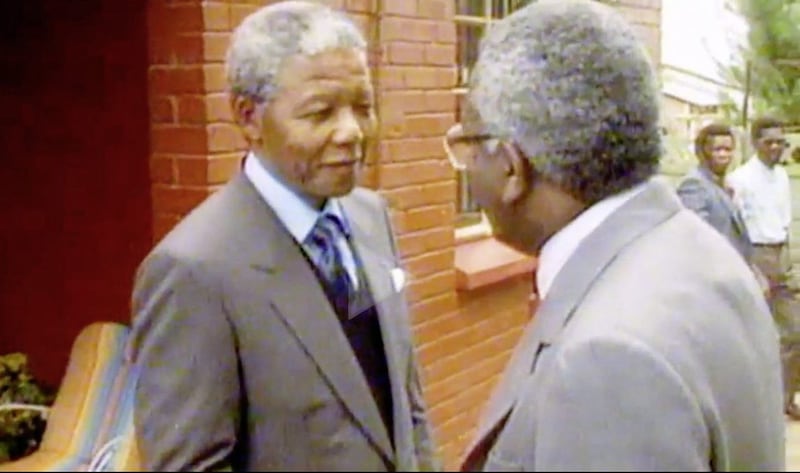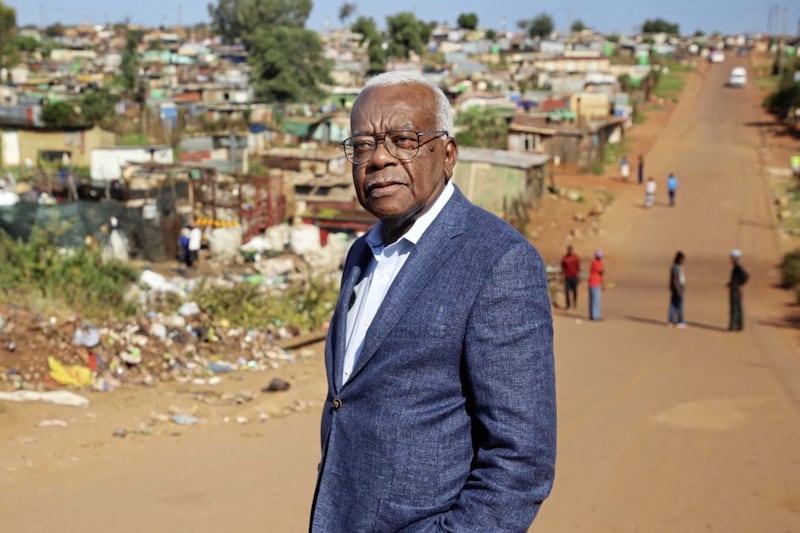NOT many people can say they've witnessed history in the making but Sir Trevor McDonald most certainly can.
The 78-year-old news veteran conducted the first interview with Nelson Mandela after his release from prison in 1990 – and yes, he felt the pressure of such an important task.
"I am a bore about preparing for interviews," quips the Trinidad and Tobago-born-journalist, who got his big break presenting the ITN early evening news in 1989. "I live and sleep them, dream about them.
"But [with Mandela] the difficulty was, you are talking to a man nobody has seen for 26 years."
Now, to mark what would have been Mandela's 100th birthday, McDonald has returned to South Africa for a new ITV documentary, in which he explores the societal changes the nation has gone through.
We see him travel to the area known by some as "the murder capital of the world", Pollsmoor Prison where Mandela was held for six years, plus the verdant winelands of Franschhoek and various inner-city neighbourhoods.
It was a profoundly personal journey for the former newsreader.
"I was always shocked by the depth of South African poverty, the poverty of black south Africans, and the appalling life of the township people," says the father-of-three.
"It is silly to have expected a dramatic change to that, because economic factors just wouldn't allow that in such a short time. I was still shocked to see people still grabbing through garbage."
One place he finds to be remarkably different in the film is the township of Soweto, where a real estate agent tells him she now sells luxury houses to the new, black middle class.
He also meets white families who, once protected by the economics of the apartheid, are now struggling to get by in a squatter camp.
"When I first heard about it [the squatter camp], I wondered if they were trying to be just separate again," he says. "In fact, their reason seems genuinely to have been to get away from the crime-ridden urban areas."
Since retiring from News At Ten in 2008, the presenter has continued to travel the world for a number of successful documentaries, such as Death Row 2018 with Trevor McDonald.
Would he say he remains fearless when it comes to his work?
"Fearless?" he exclaims, wide-eyed. "I am the biggest coward you will ever find!"
He continues: "You should have seen me whenever people fired AK47s – I used to run the other way.
"But I like, not only the travel, I love the experience of... Somebody says 'No matter how much you read, nothing prepares you for actually being there' and so, it is really nice to be there.
"I love that life, I have always liked it. I complain like hell but..." he trails off, letting out a gentle laugh.

There is one interview McDonald found particularly nerve-racking during his 50-year career.
"I was quite exercised about meeting Saddam Hussein," he says. "They didn't make it easy for us. They gave us a good run around, so some of the events I would not do again. They got us into a car [in Baghdad] one afternoon, without any idea of where we were going..."
When discussing Hussein, he recalls a bizarre coincidence that took place after a dinner in London recently.
"I was going to the Tube and this big burly guy tapped me on the shoulder, and says, 'You don't remember me, do you?'
"I said, 'To be very honest, I have drunk too much today and in any case, I am getting older, my brain is going'.
"I thought it was a humorous thing to say – he didn't smile at all. He said to me, 'I was one of your interpreters when you saw Saddam Hussein'."
It goes without saying the role of a journalist has changed hugely, even just in the decade since McDonald left News At Ten behind.
Asked whether he would go back and do his career all over again in today's world, he answers carefully.
"I have always thought interviewing is a great, great, great skill. You interview somebody on the presupposition that he has something to say – then, for God sake, let him say it!
"You get more from people if you allow them to talk, and sometimes I feel they overdo the desire to seem to be involved in the interview."
Looking back on his life in journalism, McDonald notes "it was very odd for a black reporter to go into apartheid South Africa".
But, as a diplomatic correspondent at the time, the country was his patch and he was determined to cover the story himself.
And being the first person to interview Mandela following his jail sentence is something McDonald has, quite understandably, always been proud of.
"And, even prouder of the fact that I got to know him reasonably well, and we could joke and have some fun," he adds.
Plus, it's clear the time he has spent in South Africa has left a huge mark on his own life.
"I remember coming back and saying to friends, 'Its politics is the most hideous politics I have ever seen'," he recalls. "But it is a stunningly beautiful country."
:: Trevor McDonald: Return To South Africa airs on ITV on Tuesday, June 19



